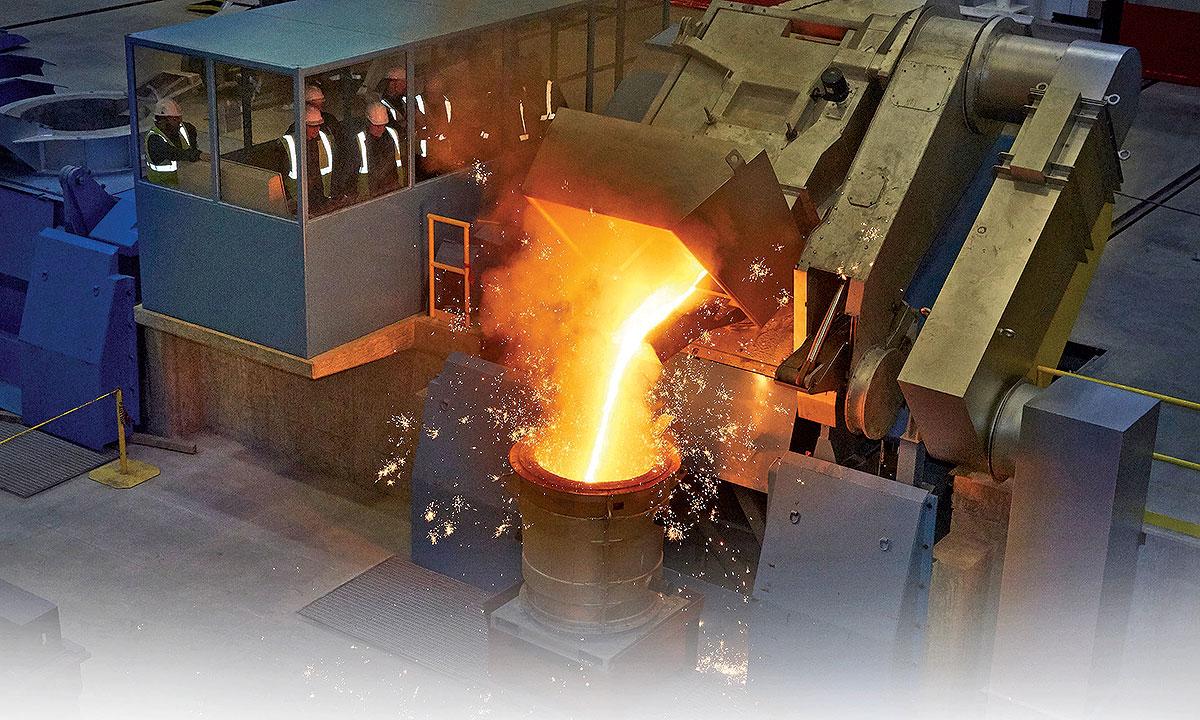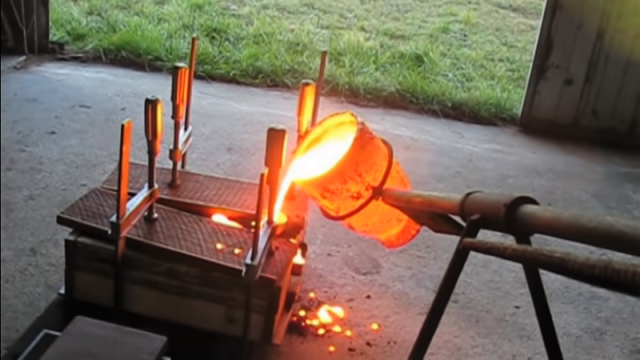What’s Next for Metal Casting in Smart Manufacturing
Wiki Article
A Comprehensive Overview to Metal Casting: Benefits and Services Offered by Foundries
Metal casting is a critical procedure in numerous markets, providing many advantages with the solutions of shops. These centers change liquified metal into sturdy and accurate components, providing to details client demands. By utilizing sophisticated innovations, shops guarantee high quality and performance in production. Nonetheless, the ins and outs of metal casting and the diverse methods included elevate vital concerns concerning its duty in modern-day manufacturing. What innovations lie ahead in this vital area?Recognizing the Metal Casting Process
The metal casting procedure is an essential technique made use of in manufacturing to create complicated shapes and components. This approach entails putting molten metal into a mold and mildew made to form the wanted item. The procedure begins with pattern development, which acts as a theme for the mold. Aluminum Casting. Numerous materials, such as sand, metal, or ceramic, are made use of for mold-making, depending upon the certain needs of the casting
When the mold is ready, molten metal is poured right into it and enabled to cool down and solidify. After solidification, the mold and mildew is removed, disclosing the actors component. Various methods, including sand casting, financial investment casting, and die casting, are employed, each suited to various applications and products. Quality control steps, such as inspections and screening, are important to guarantee the end product meets requirements. Generally, the metal casting process plays a vital function in producing components for sectors ranging from auto to aerospace.
Secret Conveniences of Metal Casting
Metal casting provides substantial advantages that make it a recommended manufacturing approach in various markets. Its design versatility and accuracy enable for detailed shapes, while cost-efficient mass production boosts efficiency. In addition, the flexibility and toughness of materials utilized in casting add to the toughness of the last products.Layout Versatility and Precision
Releasing amazing layout adaptability and precision, metal casting enables developers and engineers to produce complex forms and features that would certainly be difficult or challenging to accomplish with various other manufacturing techniques. This capacity enables the production of intricate geometries, internal frameworks, and great information that boost product performance and aesthetic appeals. Additionally, different casting techniques, such as sand casting, financial investment casting, and die casting, provide more options for modification, fitting varied product buildings and job demands. The flexibility of molds allows alterations during the design phase, improving the shift from concept to end product. Inevitably, metal casting attracts attention for its ability to deliver high-precision components, making it an indispensable procedure in markets varying from vehicle to aerospace and beyond.Affordable Automation
Affordable automation stands as one of the main advantages of metal casting, allowing makers to create big amounts of components at a lower cost each. This performance occurs from the capability to create intricate molds that can be reused multiple times, substantially reducing arrangement and functional costs. Additionally, metal casting procedures, such as sand casting and pass away casting, enable for high throughput, making it practical to satisfy the demands of large-scale manufacturing runs. The minimized material waste and power intake additionally enhance cost financial savings, making metal casting an eye-catching option for sectors requiring bulk parts. Generally, the affordable nature of metal casting placements it as a favored approach for makers aiming for financial efficiency in their manufacturing processes.Product Adaptability and Strength
Among the standout qualities of metal casting is its impressive material adaptability, which allows for the usage of a wide variety of alloys and metals. This adaptability allows suppliers to pick products that ideal match their certain applications, from light weight aluminum and bronze to iron and steel. Each metal provides one-of-a-kind properties, including differing levels of strength, deterioration resistance, and thermal conductivity. Consequently, metal casting can create elements that fulfill stringent performance requirements across diverse markets, such as auto, aerospace, and construction. Additionally, the strength of cast metals can be improved with different treatment processes, making sure durability and longevity. Metal Casting. Generally, the mix of product convenience and inherent stamina makes metal casting a favored selection for producing premium partsKinds Of Metal Casting Methods
Metal casting incorporates a variety of techniques that deal with various production needs and material properties. Usual methods include sand casting, which uses a sand mold and mildew for intricate shapes, and investment casting, recognized for its accuracy and surface area coating. Pass away casting is an additional strategy that employs high-pressure injection of molten metal into mold and mildews, perfect for mass manufacturing of tiny parts.Covering molding uses a quicker alternative, making use of a resin-coated sand to produce thin-walled molds, while shed foam casting allows for detailed styles without the need for a core.
In addition, constant casting is made use of for creating lengthy sections of metal, such as sheets or bars, by solidifying liquified metal in a constant process. Each strategy provides unique benefits and is chosen based upon elements like the called for detail, manufacturing volume, and product type, ensuring exceptional end results in metal construction throughout various industries.
The Duty of Foundries in Metal Casting
Factories play a critical duty in the metal casting process, offering as the facilities where Visit This Link liquified metal is transformed right into finished products. These specialized facilities are geared up with the essential tools and modern technologies to handle different steels, guaranteeing high-quality results. Shops are accountable for numerous important functions, consisting of melting the metal, putting it into molds, and enabling it to solidify.Additionally, they keep rigorous safety and security and environmental standards to protect employees and reduce environmental influence. Skilled technicians and engineers team up to enhance casting processes, improving effectiveness and minimizing waste. Foundries additionally participate in high quality control measures, guaranteeing that the end products satisfy certain resistances and requirements. This top quality guarantee is vital for sectors that depend on exact elements, such as vehicle and aerospace. As a result, factories contribute significantly to the overall manufacturing landscape, enabling innovation and growth across various sectors.
Personalized Metal Casting Providers
Personalized metal casting services provide tailored layout remedies that satisfy certain client needs. These solutions likewise give product option proficiency, guaranteeing the best metal is selected for the desired application. Such flexibility and knowledge enhance the general high quality and performance of the end product.
Customized Style Solutions
Customized style services in metal casting provide suppliers with the flexibility to develop elements that meet particular performance and visual demands. Foundries use customized solutions that permit customers to specify dimensions, forms, and surface area coatings to achieve desired end results. This customization process typically consists of cooperation in between engineers and designers, making sure that the end products straighten with operational requirements and sector standards. Advanced innovations, such as computer-aided layout (CAD) and simulation software, allow exact modeling and screening of components before manufacturing, improving and decreasing errors efficiency. By leveraging tailored design options, services can maximize capability while lowering waste and expenses, eventually causing a more competitive edge in the market. This flexibility is crucial for sectors needing distinct applications and specifications.Product Choice Experience
When choosing materials for metal casting, proficiency plays an essential duty in making sure that the best choice lines up with both performance needs and cost-effectiveness. Factories employ knowledgeable specialists that comprehend the residential or commercial properties of different steels and alloys, permitting them to suggest perfect materials for particular applications. Variables such as strength, deterioration resistance, and thermal conductivity are thoroughly considered to fulfill the client's demands. Additionally, market trends and improvements in material scientific research inform these decisions, making it possible for factories to remain competitive. By leveraging their experience, factories can aid clients in guiding via complex product options, inevitably resulting in boosted item top quality and decreased manufacturing costs. This specialized expertise is vital for accomplishing effective results in customized metal casting services.Quality Assurance in Metal Casting
Quality control in metal casting is important to assure that the last items fulfill the required specifications and performance requirements. Foundries employ a selection of techniques and strategies to assure the finest of cast elements. This process begins with strict product assessments, verifying that resources comply with industry standards. Throughout the casting process, real-time monitoring and screening are performed to analyze criteria such as temperature level, mold and mildew honesty, and dimensional precision.
Applications of Metal Castings Across Industries
Metal castings play a vital duty in various markets, working as the foundation for plenty of applications. In the automotive industry, cast parts such as engine blocks and transmission real estates are needed for lorry efficiency and reliability. The aerospace industry counts on precision castings for important parts that assure safety and performance in flight. Furthermore, the construction industry uses metal castings for fixtures, fittings, and structural elements, enhancing the sturdiness of structures and framework.The power industry advantages from spreadings made use of in turbine blades and other devices necessary for power generation. The clinical area also makes use of metal spreadings in tools and tools, showing the convenience of this production process. Overall, metal spreadings are important to the performance and development of varied markets, showcasing their significance in modern innovation and infrastructure development
Frequently Asked Questions
What Materials Are Commonly Used in Metal Casting?
Usual materials used in metal casting consist of aluminum, iron, bronze, steel, and brass. Each product uses unique buildings ideal for different applications, allowing makers to select the very best option based upon strength, weight, and rust resistance.How much time Does the Metal Casting Process Typically Take?
The metal casting procedure typically takes a number of hours to a couple of days, depending on aspects such as the intricacy of the design, sort of metal made use of, and the specific see post casting technique utilized by the More Help shop.
What Is the Environmental Effect of Metal Casting?
The ecological influence of metal casting consists of energy usage, discharges, and waste generation. Shops typically carry out measures to reduce these impacts, such as reusing products and making use of cleaner technologies to decrease their environmental impact.Can Metal Casting Be Provided For Small-Scale Projects?
Metal casting can indeed be carried out for small-scale jobs. Numerous shops deal with such needs, providing personalized options that fit minimal manufacturing runs while keeping top quality and precision in the final items.What Are the Precaution in Metal Casting Foundries?
In metal casting factories, safety and security actions consist of individual safety equipment, proper ventilation, training on devices use, emergency procedures, normal upkeep checks, and adherence to sector security requirements to minimize dangers linked with liquified metal and hazardous materials.Furthermore, metal casting procedures, such as sand casting and die casting, enable for high throughput, making it viable to satisfy the demands of massive production runs. One of the standout features of metal casting is its remarkable material convenience, which allows for the use of a broad variety of alloys and metals. In addition, continual casting is utilized for producing lengthy sections of metal, such as bars or sheets, by strengthening liquified metal in a continuous process. Shops play an essential role in the metal casting procedure, offering as the facilities where liquified metal is changed into ended up products. Usual materials made use of in metal casting consist of aluminum, iron, bronze, steel, and brass.
Report this wiki page